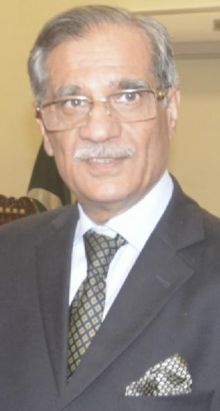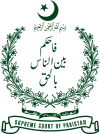Mian Saqib Nisar | |
|---|---|
 Justice Nisar in 2018 | |
| 25th Chief Justice of Pakistan | |
| In office 31 December 2016 – 17 January 2019 | |
| Preceded by | Anwar Zaheer Jamali |
| Succeeded by | Asif Saeed Khosa |
| Senior Justice of the Supreme Court of Pakistan | |
| In office 18 February 2010 – 30 December 2016 | |
| Preceded by | Anwar Zaheer Jamali |
| Succeeded by | Asif Saeed Khosa |
| Justice of the Lahore High Court | |
| In office 22 May 1998 – 17 February 2010 | |
| Law Secretary of Pakistan | |
| In office 29 March 1997 – 12 October 1999 | |
| Advocate-on-Record of the Supreme Court | |
| In office 22 May 1994 – 21 May 1998 | |
| Secretary General of Lahore High Court Bar Association | |
| In office 1991–1992 | |
| Personal details | |
| Born | Mian Saqib Nisar 18 January 1954 Lahore, Punjab, Pakistan |
| Citizenship | Pakistani |
| Nationality | |
| Residence(s) | Lahore, Punjab Pakistan |
| Alma mater | Government College University Punjab University |
| Profession | Advocate |

Mian Saqib Nisar (Urdu: میاں ثاقب نثار; born 18 January 1954) is a Pakistani jurist who served as the 25th Chief Justice of Pakistan from 31 December 2016 till 17 January 2019. He has previously served as the Law Secretary. He also served as a visiting professor of law at the University of the Punjab, where he provided instructions on constitutional law.[1]
Ascended as the Justice of the Supreme Court on 18 February 2010, he was elevated as chief justice when Justice Anwar Zaheer Jamali reached his constitutionally set retiring age.[2][3]
Early life and education
Saqib was born in 1954 in Lahore, West Punjab, into a Punjabi Muslim Arain family. His father, Mian Nisar was an advocate.[4] Nisar was educated at the Cathedral High School no 1 in Lahore where he matriculated and enrolled at Government College University (GCU) where he graduated with a B.A. degree in 1977.[5] He later joined Punjab University Law College where he secured LLB in civil law in 1980.[6] He took active part in co-curricular activities during his study. He was also a part of Law College's debating society.
While being an undergraduate student at the GCU Lahore, he was selected to be a member of the international delegation representing Pakistan in International Youth Conference held in Tripoli in Libya in 1973.[7]
Career
Early career
Soon after his graduation with a law degree, Nisar enrolled as an advocate and began private practice of law at the District Court in 1980. In 1982, he enrolled as an advocate of the Lahore High Court.[8] He practiced law as an advocate for a decade until he enrolled as an advocate Supreme Court in 1992, subsequently relocating to Islamabad.[9] In 1991, he was elected as a Secretary-General of the Lahore High Court bar.[10]
On 29 March 1997, he was appointed as Law Secretary at the Ministry of Justice and Law (MoJL)– a chief bureaucratic position inside the law and justice ministry.[1] His appointment as the Law Secretary of Pakistan was nominated and confirmed by Prime Minister Nawaz Sharif immediately after being elected in general elections held in 1997.[11] His appointment as a law secretary was noted as the first time in the history of the country that someone from the Bar had been appointed to such post.[12]
On 22 May 1998, he was elevated as judge at the Lahore High Court after a nomination summary sent by Prime Minister Sharif, only to be confirmed as judge of Lahore High Court by then-President Rafiq Tarrar.[12] As a judge in Lahore High Court, he heard and passed judgements on many important cases involving the resolution of disputes on the civil matters, commercial banking disputes, and tax evasions/avoidances.[12]
In 2000, Nisar was among those judges at the Lahore High Court, who when given chance to either resign or accept military provisional constitutional order enacted by Military Dictator General Musharraf, took the oath under the new provisional constitutional order and was continue to allow hearing cases at the Lahore High Court.[13]
Academia
Justice Nisar is known for his educational interests in legal education, and is currently tenuring as visiting professor of law at the Law College of the Punjab University where he provides instructions on the constitutional law and civil law procedure.[14] Justice Nisar attended and represented Pakistan in the international conference on "India and Pakistan at Fifty" held in Wilton Park in United Kingdom; he also led judicial delegations on conferences held in the Philippines and Switzerland.[15]
In 2009, Justice Nisar authored a paper on Islam and democracy and presented the paper to the Norwegian Academy of Science and Letters in Oslo, Norway, and offered discussion on the "Role of the Courts in Islamic Democratic Society."[15]
Supreme Court Justice
On 13 February 2010, his nomination to be elevated as the justice of the Supreme Court was initially rejected by the then-President Asif Ali Zardari in spite of recommendation made by Chief Justice Iftikhar Muhammad Chaudhry.[16] President Zardari instead elevated Justice K.M. Sharif that ultimately supersedes senior-most Justice Nisar for the promotion, appointing the latter as acting Chief Justice of Lahore High Court.[16]
Upon hearing these developments, Chief Justice Chaudhry suspended the appointment order and marked such actions as "unconstitutional", using his constitutional powers granted by the Judicial Commission.[17]
On 19 February 2010, Justice Nisar, alongside A.S. Khosa, were sworn as justices of the Supreme Court in a simple ceremony.[18]
Notable cases
He was a member of the Supreme Court bench which heard the case against 21st Constitutional Amendment, the amendment which authorized the establishment of military courts to hear terrorism cases after the incident which killed 141 people including 132 children in a school in Peshawar on 16 December 2014.[19]
He also heard the case where Pakistan Railways's land worth Rs10 billion was allotted to Royal Palm Golf Club by Musharraf government which federal government of Nawaz Sharif wanted back in 2014.[20]
He headed the bench which heard the case of Jehangir Khan Tareen and Imran Khan.
Criticism
Judicial activism and allegations of nexus with the military
Justice Nisar has been criticized by some notable academics, journalists, and politicians for his judicial activism and over-involvement in the day-to-day affairs of the government.[21][22] He is accused of being in alliance with Pakistan's military establishment against Pakistan Muslim League (N), Nawaz Sharif and his government which was ousted in July 2017.[23][24] Despite political rhetoric none of the allegations are proven, or contested in any court of law.
References
- ^ a b "Hon'ble Chief Justice of Pakistan". www.supremecourt.gov.pk. Supreme Court of Pakistan Press. Archived from the original on 1 February 2017. Retrieved 28 February 2017.
- ^ Web desk, staff writers (30 December 2016). "Justice Mian Saqib Nisar to take oath as new CJP tomorrow" (jtml). pakistantoday.com. Islamanad: Pakistan Today, Islamabad. Pakistan Today. Archived from the original on 28 February 2017. Retrieved 28 February 2017.
- ^ "Four LHC judges take fresh oath". Dawn.
- ^ From the Newspapers, Staff reporters (10 September 2011). "Saqib Nisar's father laid to rest". DAWN.COM. Dawn Newspapers, 2011. Dawn Newspapers. Archived from the original on 28 February 2017. Retrieved 28 February 2017.
- ^ WebDesk Samaa (31 December 2016). "Profile – Justice Mian Saqib Nisar | SAMAA TV". Samaa TV. Samma TV 2016. Samma TV. Archived from the original on 1 March 2017. Retrieved 1 March 2017.
- ^ ARY News, Staff (7 December 2016). "Justice Saqib Nisar named next CJP". www.arynews.tv. ARY News. Archived from the original on 28 February 2017. Retrieved 28 February 2017.
- ^ "Lahore High Court, Lahore". sys.lhc.gov.pk. Lahore High Court Press. Archived from the original on 17 March 2015. Retrieved 6 March 2017.
- ^ "Justice Saqib Nisar appointed as next Chief Justice of Pakistan". Geo News. 7 December 2016. Archived from the original on 7 March 2017. Retrieved 6 March 2017.
- ^ Idrees, Mohammad (31 December 2016). "Justice Saqib Nisar sworn in as 25th Chief Justice of Pakistan". Daily Pakistan Global. Archived from the original on 7 March 2017. Retrieved 6 March 2017.
- ^ "Justice Saqib Nisar to replace Chief Justice Jamali on Dec 31". Aaj News. 31 December 2016. Archived from the original on 7 March 2017. Retrieved 6 March 2017.
- ^ News Desk, Geo News Anchors (31 December 2016). "Justice Saqib Nisar sworn in as 25th Chief Justice of Pakistan". www.geo.tv. Geo News, News Desk anchors. Geo News. Archived from the original on 7 March 2017. Retrieved 6 March 2017.
- ^ a b c "Justice Mian Saqib Nisar appointed new CJP". Pakistan Today. 7 December 2016. Archived from the original on 7 March 2017. Retrieved 6 March 2017.
- ^ Sattar, Babar (6 September 2008). "Cherry picking again". www.thenews.com.pk. Islamabad: News International, 2008. News International. Archived from the original on 14 March 2017. Retrieved 13 March 2017.
- ^ "Justice Saqib Nisar takes oath as 25th chief justice of Pakistan". Dawn Newspapers. 31 December 2016. Archived from the original on 5 April 2017. Retrieved 4 April 2017.
- ^ a b "Justice Mian Saqib takes oath as new CJP". Archived from the original on 6 April 2017. Retrieved 4 April 2017.
- ^ a b etl.al, staff reporters (13 February 2010). "President rejects CJ recommendations: LHC CJ Khawaja Sharif elevated to SC. - Free Online Library". www.thefreelibrary.com. Balochistan Times, 2010. Balochistan Times. Retrieved 13 March 2017.
- ^ "President overrides CJ's recommendation on judges' elevation; SC suspends Zardari's orders". News International. 14 February 2010. Archived from the original on 14 March 2017. Retrieved 13 March 2017.
- ^ "Three SC, 9 SHC judges sworn in". The Nation. 19 February 2010. Archived from the original on 14 March 2017. Retrieved 13 March 2017.
- ^ "Terrorism cases: Unfair to blame judges over delay in prosecution, says SC". The Express Tribune. 22 May 2015. Archived from the original on 22 December 2015. Retrieved 11 December 2015.
- ^ "Rs10b loss: SC asked to declare 141 acres PR land lease to golf club invalid". Customs Today. 4 December 2014. Archived from the original on 22 December 2015. Retrieved 11 December 2015.
- ^ Hanif, Mohammed. "Judicial activism is hurting governance in Pakistan". www.khaleejtimes.com. Retrieved 20 April 2018.
- ^ Masood, Salman (11 February 2018). "Court Takes an Activist Role in Pakistan. Not Everyone Sees It as Just". The New York Times. ISSN 0362-4331. Retrieved 20 April 2018.
- ^ "Political parties unite against 'military-judiciary alliance'". Retrieved 20 April 2018.
- ^ "Pakistan: General Elections Subverted By Army-Judiciary Nexus – Analysis". eurasiareview.com. 6 July 2018. Retrieved 6 July 2018.

